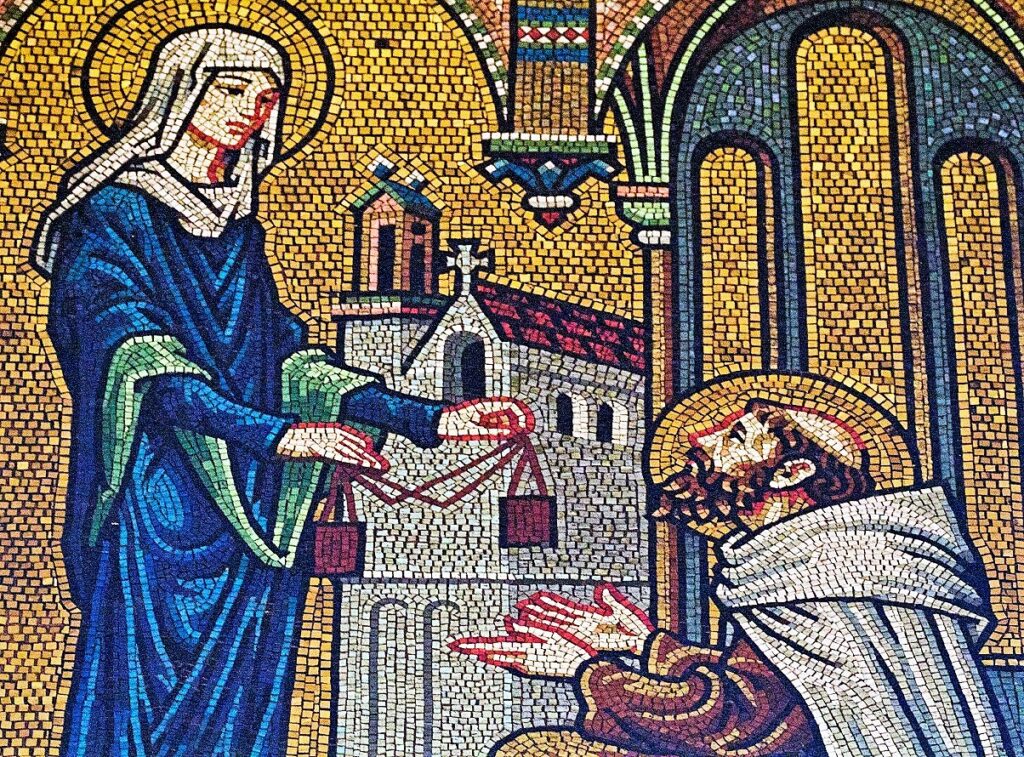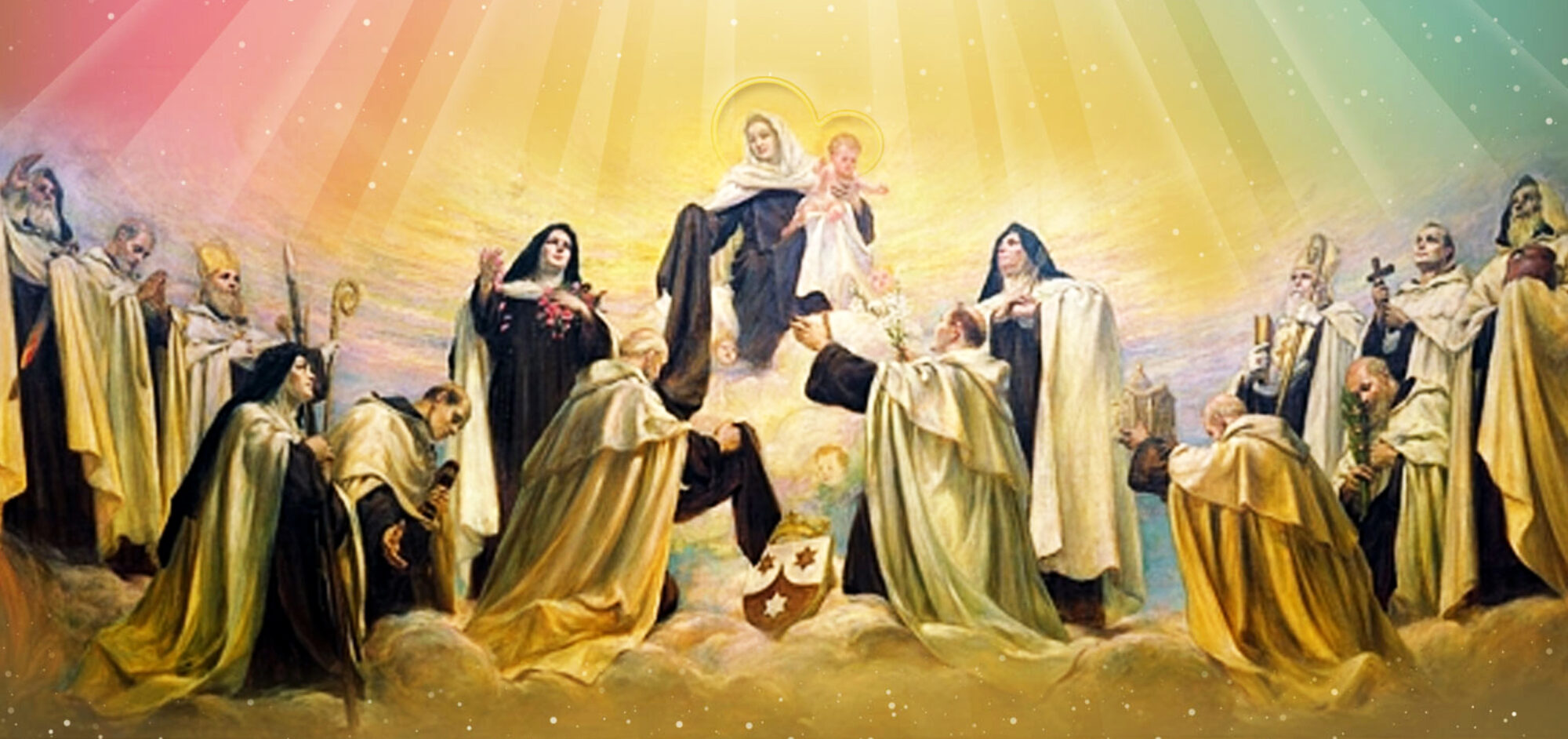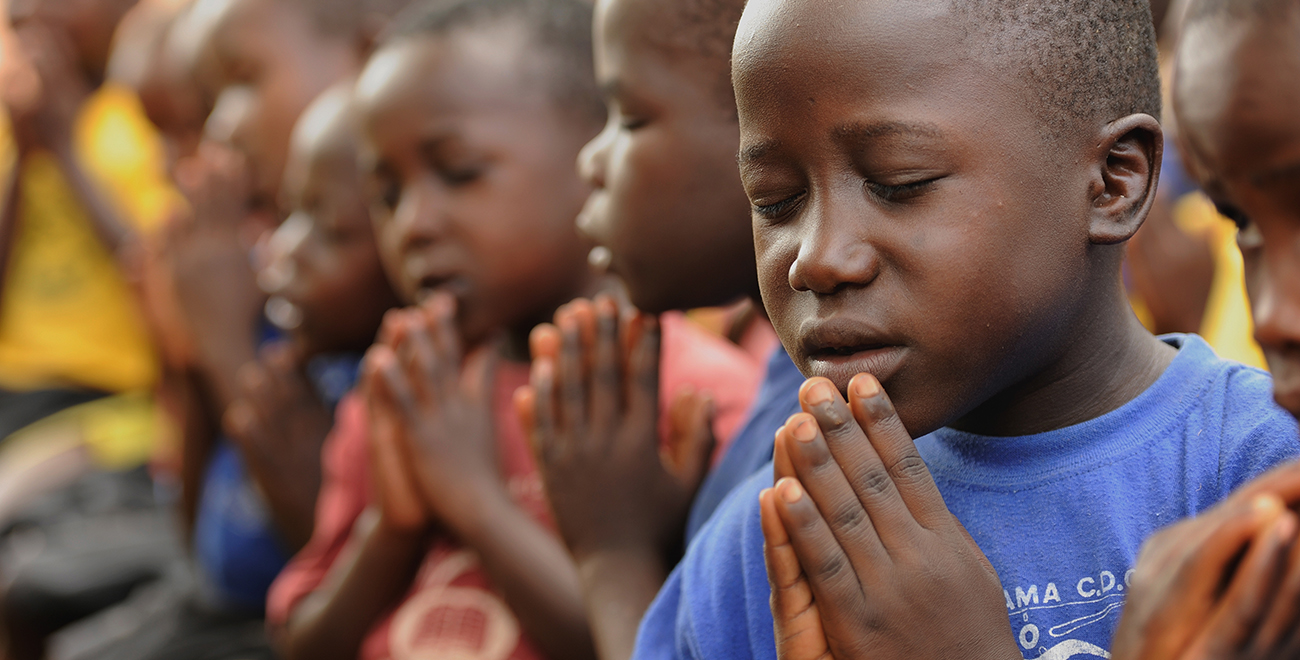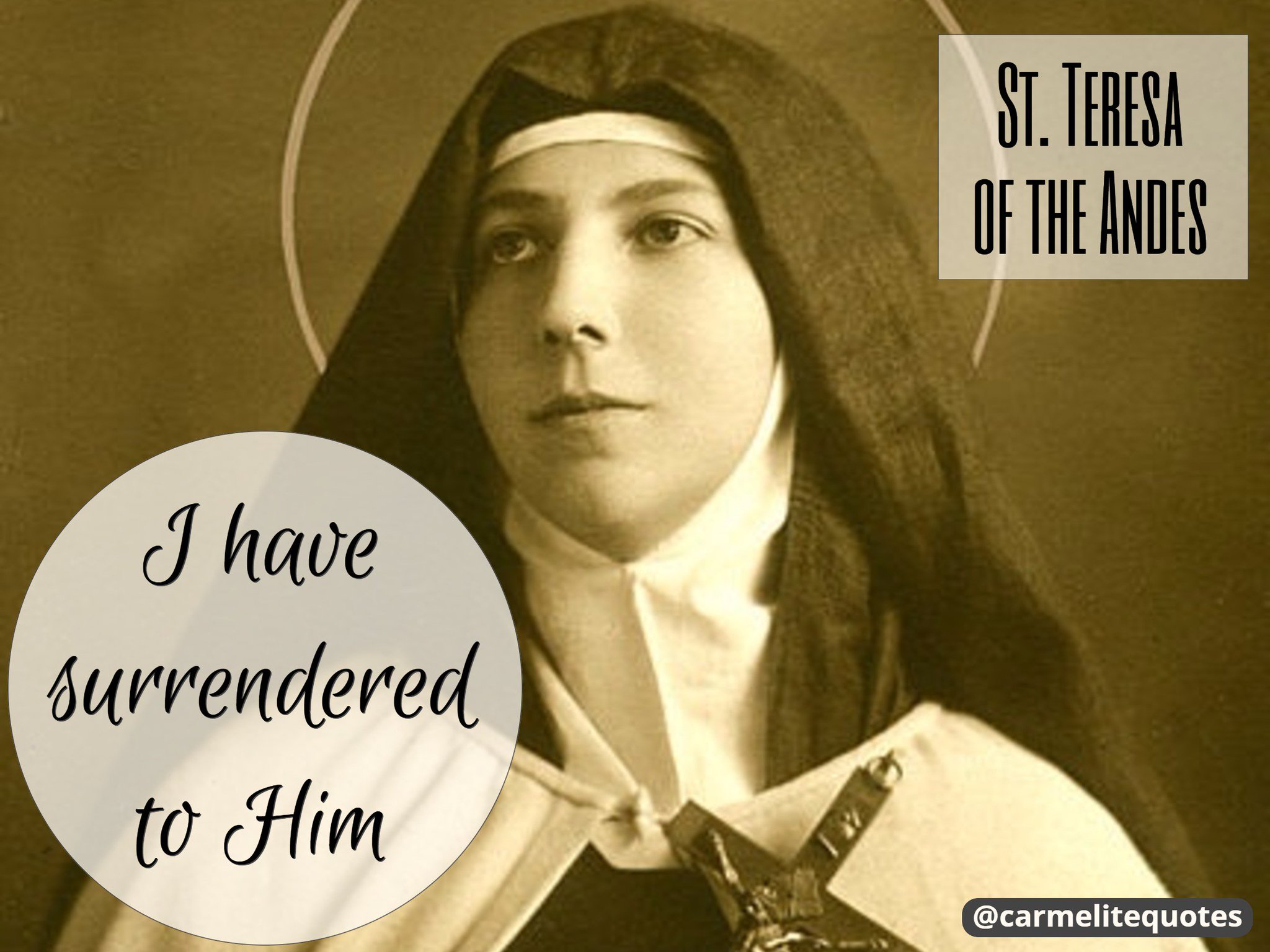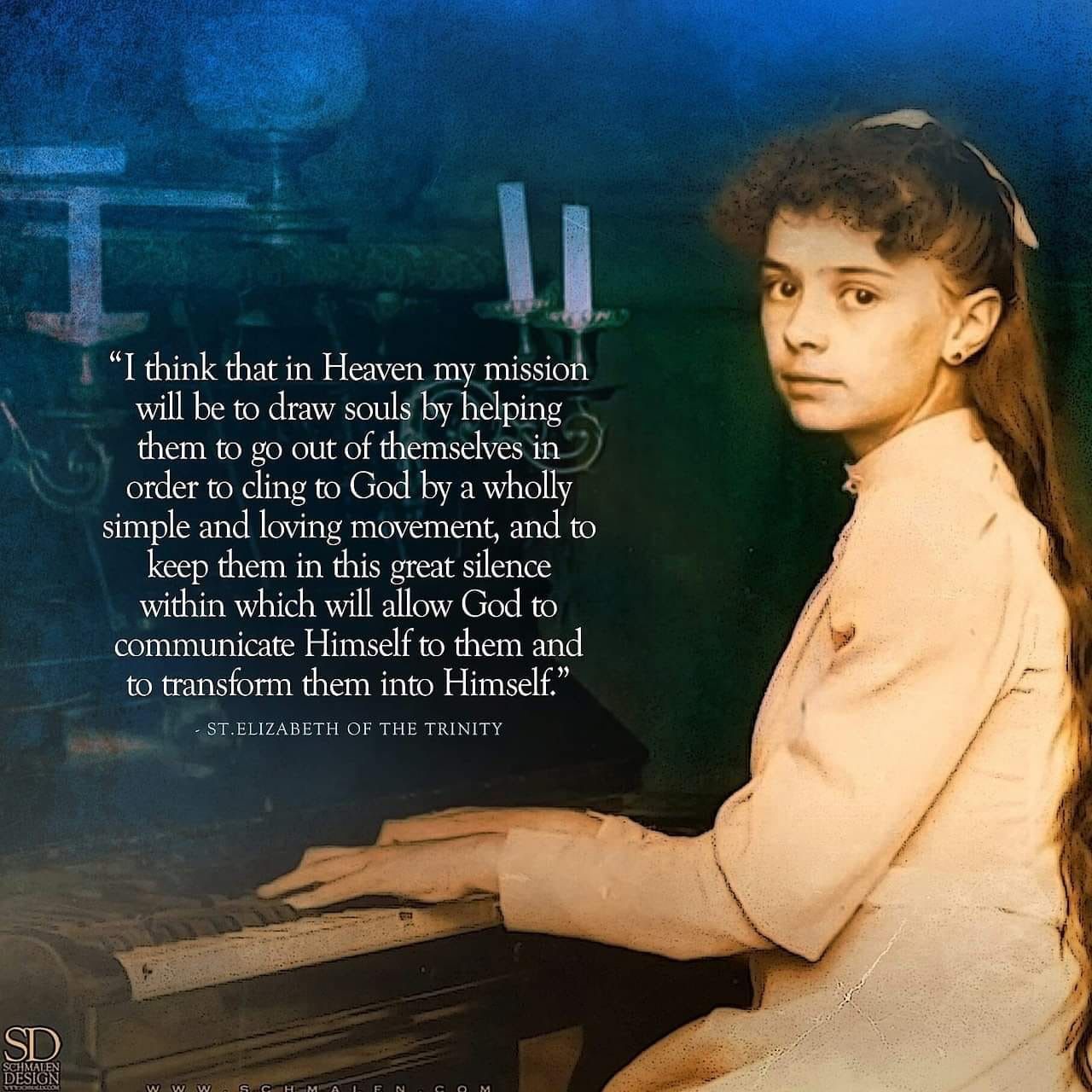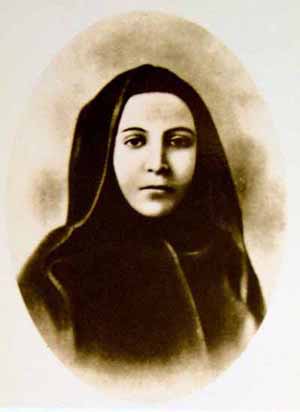
BLESSED JOSEFA NAVAL GIRBES OCDS (1820-1893), CARMELITE SECULAR, VIRGIN
Life of a Beautiful Saint
†Josefa Naval Girbes was born in Algemesi, Valencia Province, Spain, on December 11, 1820. Algemesi was a highly agricultural village, with about 8000 inhabitants. It had only one parish, a Dominican Monastery, a hospital, a few educational centers and some basic industry. Her parents were Francisco Naval Carrasco, and Josefa Girbes, and her five brothers and sisters: Maria Joaquina (who died very young), another Maria Joaquina, Vincente, Peregrina (who died when she was fourteen years old), and the youngest Josefa who died just after being born.
From her parents Maria Josefa inherited her faithful spirit, her deep-rooted piety, her love for work and the ardent desire to always live in the state of grace. Maria Josefa was baptized the same day she was born, and soon she was called only Josefa. Later some of her followers called “Senora Pepa”.
When Josefa was eight years old, she received the Sacrament of Confirmation. She acquired a basic education, which was enough to develop her life in that environment. She learned embroidery, an activity that she successfully taught her numerous disciples.
Her childhood passed without any special events. Her mother effectively collaborated in her religious formation. From her early years she learned to love the Blessed Virgin, who was venerated at the Dominican Friars Monastery near her home. At a very young age she showed a strong energetic character that would be central in her apostolic activity. She made her First Communion when she was only nine years old, a bit of an exemption, since the custom at that time was to wait until the person was eleven years old.
Josefa’s mother died when she was thirteen. While praying to the Blessed Virgin at the Dominican Friars Monastery, Josefa was assured that Mary would never abandon her. She then went with her father, brother and sisters, to live with her maternal grandmother.
Josefa turned out to be an ideal housekeeper. In addition to her own family duties, she added the exquisite care of her sick grandmother, without abandoning her life of piety. She did not make concessions to the routine of her life or to fatigue. Her grandmother died when she was 27 years old. Josefa continued to live in that house with her father, her uncle Joaquin and her surviving sister and brother, Maria Joaqhina and Vicente.
Her father died when he was 62 years old, and Josefa was 42. Her sister Maria Joaquina got married, but died when she was 43. Her brother Vicente also married and had three children who died very young, as did his wife. A widower, he went to live with his sister.
Her uncle Joaquin, a saintly single man, died when he was 77, in the year 1870, the same year Josefa invited her disciple and confidant Josefa Esteve Trull to live with her, and to whom she left all her belongings to be used to continue her work.
Josefa was of medium height and build. Her skin was light and delicate, her face was oval. She had bright eyes that gave a sense of depth, but was very modest. She had deep brown hair that later became gray, and a soft caressing voice. She used to smile frequently, but was never seen laughing. Her step was moderate, and she used to dress in dark colors, wearing low shoes and a long veil. Her overall appearance was simple and modest.
At eighteen years of age, she choose Jesus as her only spouse, and on December 4, 1838, consecrated her virginity to Him forever; keeping her heart undivided (1Cor 7:32-34). She made continual progress in her union with Christ and dedicated herself with all her strength, to answer the call to holiness and to the service of the Church and her neighbor. She demonstrated that virginity is a true sign of love and a very special source of spiritual fruitfulness in the world, (Light to the Gentiles, Ch 42).
Josefa looked for opportunities to praise Christ by her word and her actions, both to unbelievers, to attract them to the faith, as well as to believers to instruct them and confirm them in their faith and to stimulate them to a life of piety and fervor. With this goal in mind, she used to teach girls Christian doctrine. She also visited people, and provided counsel to the ones who requested it. She even helped restore peace in broken families. Josefa organized at her home a circle of mothers with the intention of guiding then in Christian formation. She guided women to virtue that had taken wrong directions, and she used to prudently admonish sinners.
The primary task to which she addressed her care and energy was the Christian education of young women. She opened a free embroidery school at her home, and also taught manual skills which she knew very well. This workshop was assiduously and enthusiastically attended by many young women from all social levels. It became a center of community living, of prayer; a place for praising God and reading and explaining sacred scripture and eternal truth.
In this way she effectively contributed to the religious growth of her parish, forming good mothers, promoting vocations to the consecrated life and teaching all to be good citizens of the people of God. Because of this, she acquired great esteem and fame of sanctity among both the clergy and the laity. Even after her death, on February 24, 1893, (at the age of 73) her reputation kept increasing due to her life of holiness and works of charity.
Clothed with the habit of the Third Order of Carmel, she was placed in a simple coffin. The next morning, February 25th, her funeral Mass was celebrated and she was buried in the afternoon. Her coffin, draped with white ribbons, was carried by four of her youngest disciples. Dofla Josefa Esteve Trull, her preferred disciple, placed her coffin in a temporary acquired niche, and later moved it to find her definitive resting place in 1902.
There, she remained, incorrupt, until her transfer to the parish, on October 20, 1946. The Archbishop of Valencia and the clergy initiated her Cause for Beatification with an Informative Diocesan Process, celebrated during the years 1950 to 1952, which was followed be an Additional Process in 1956.
On January 3, 1987, his Holiness John Paul II approved the decree on the heroic virtues of Josefa Naval Girbes. On September 1, 1988 the proposed miracle for her Beatification was accepted. The Beatification ceremony was celebrated in Saint Peter’s Basilica on September 25, 1988. In our liturgical calendar her feast is celebrated on November 6th.
A Vocation to the Secular Order of Carmel
Josefa Naval Girbes is, without any doubt, an example for all who are called to holiness of life without abandoning secular society, that is, without leaving their home, their family, and their professional work. She remained in the world to be a model of holiness, and a model for secular society. Josefa did not profess the vows of the consecrated religious life. She did not enter a convent, for some desire for comfort or to escape the severity of close family living. She remained in secular society. Without leaving her home, she fully lived the evangelical counsels, and she became a model for the majority of the daughters and sons of the Church, it seculars members.
Josefa was fully conscious of her secular state of life in the Church. She was an ideal housekeeper at thirteen years of age, managing a large family of seven members. She walked her roads of holiness, totally devoted to God, in service to her neighbor. To her secular way of life she freely added the gift of her virginity, which united her in intimacy with God and made her available for an apostolic action that was visibly fruitful. Josefa was a secular virgin, enjoying the two vocations at the same time.
Josefa Naval comes to the world of today with her virtues and apostolic activities as a much-needed example to guide us along the roads of sanctity: a replicable role model for the secular members of the Church.
This saintly woman from Algemesi lived, as a secular person, a life of evangelical holiness. She devoted herself to an apostolate among the young women in her village, providing an invitation for a life of virtue and faith. She, who helped fill up many cloistered convents with novices for virgins in the consecrated life, remained in secular society to provide testimony. She was a witness of how consecration to God is a sign of love and a very special source of fruitfulness in the middle of the world. “Sanctify yourself and sanctify others!” This was a guiding principle of this blessed virgin: always and in everything, to follow God’s desire, in her ordinary life circumstances and her secular duties.
Undoubtedly, Josefa pondered the possibility of devoting her life within some convent. For sure she shared this possibility with her spiritual director, but with the light given by the Lord, which she humbly and obediently received, and with her director’s counsel, she clearly saw that she should stay in secular society to help guide individuals who needed her direction, her example of devotion to God and the benefits of her apostolic activities.
Her place in the Church was always well defined. Remain in the world, but be not of the world. Josefa assumed her call to holiness through her union with God be love, faithfully living His will, in her secular condition.
Josefa fully lived in the love of God and shared that love by reaching out to others, and in this manner, she shared her road to holiness. “Search for holiness by simplicity,” and “Reach holiness no matter what the cost.”
What she taught her disciples, Josefa lived to the fullest. In the middle of secular society, simply and naturally as a consecrated virgin, our Josefa grew to holiness that other individuals reached in the silence of the cloisters.
Vocational Ideals
Josefa Naval Girbes, opening wide her soul, used to say, “My ideal is not to lengthen my life, but to sanctify my life,” She practiced to a heroic degree the theological virtues of faith, hope and love. This exercise, as we Carmelites well know, leads to self-denial, abandonment, and surrender of ourselves as vocational ideals.
Her life was all for God: “We have to twist our will in order to make it loose all that is not God’s will.” God’s will was revealed with a deep spirit of faith, in Sacred Scripture and in the understanding of the obligation of her secular state of life. The joy of fulfilling those dutiers, which she taught to her disciples, is expressed in the following words: “The fulfillment of our duties is the way; the degree of love with which we comply is the measure of the virtue our soul has.”
Josefa Always had a clear knowledge of God’s goodness, which is why she placed all her trust in Him. She, who sought all the eternal goods and worked to achieve them, relied always on God’s help. To accomplish this, she consecrated her whole life: by her suffering, which was not small, mainly caused by her sickness which accompanied her since she was thirty years old, until her death; by her labors, the domestic ones which she had to face since being thirteen years old, and the ones she imposed upon herself at the workshop-school she founded; by her apostolic restlessness which led her to have deep concern for all who lacked material or moral things.
She always placed her trust in God’s Providence and it was for duty to inspire the trust in her disciples. So she used to tell them: “nobody should distrust god because they see their own sins. Our trust does not rely on who we are, but Donahue Guardians and on the merciful twelve he has for us.”
Josefa of was a humble serf of the Lord. The humble person recognizes her nothingness, her complete dependence on God, and trusts in God’s hands. She humbled herself at Church, before God’s majesty; and in that humble attitude she spent the entire day, while dedicating herself to all kinds of work, even the most humble jobs. She never accepted the help of her disciples with domestic duties. She loved to retreat and to be unnoticed. She did not speak about herself, or about her accomplishments. Wishing her disciples to love the virtue of humility, she used to tell them: “We are what we are before God; we ought to do everything, with great purity of intention. If afterwards we are scorned, we must keep silent, without arguing, even if we are humanly right.”
Josefa life was steeped and God’s love. Her faith enabled her to see God as infinitely kind. She felt that He, who is Absolute Goodness and satisfies all the person’s aspirations, deserves to be loved. Her love was a deep love in abnegation, sacrifice, and total devotion to fulfill His will: “to know god peas to surrender of what: to love god is to suffer; true love peace proven in sacrifice.”
Josefa also knew that God’s love acted through her to God’s people: She loved others on behalf of God. This love started with the conviction that we are all children of God, all brothers and sisters of Jesus Christ. She always kept in mind the word of the Lord (1 John 4:20). She loved her relatives: her parents, her grandmother, her uncle, her sisters, and her brother Vicente, who had an unkind attitude toward her. This love continued even when Vicente, as a widower, came back to live with her. She loved her superiors, especially the priests, including her wise spiritual directors. She loved her disciples, with a proportionate passion to her zeal. But over all, she loved the poorest, to whom she dedicated her greatest zeal.
Her love of the Cross was a constant message for all her disciples. She was accustomed to saying: “Let us conform ourselves to the sacrificial love of Jesus revealed in His Passion. You must carry your cross, fulfilling your duties as required by God. Suffer with love; take advantage of all uncomfortable situations. Love, love and suffer in silence; Love is proven in sacrifice. Sacrifice your desires.”
Experience of the Carmelite Charism
As a contemplative person, Josefa was always striving for holiness. To reach it, she made use of all the means the Carmelite Charism offered.
Prayer – Josefa Naval was a person with a deep interior life. Her faith led her to the conviction that God, One and Three, lives in our souls in grace. She fully lived that counsel of Jesus Christ: “Who loves me, will be loved by my Father, we will come to him, and will make in him our home” (Jn 24:23). She was immersed in all these truths, and many times she seemed transfigured in the middle of her duties. More than once she had to go to her room, where once recollected, she would join her hands and close her eyes, and dedicate a long time to contemplation.
She nourished her interior life with the Eucharist and prayer: oral prayer that was learned from her mother; mental prayer that she would do in the early hours of the morning at the Parish. After daily Mass and Communion, she spent quiet, intimate spiritual moments with her Spouse, Jesus. At the closing of her daily work, before retiring for the night, she dedicated some time to an intimate spiritual moment with the Lord. In this secret communication with God, Josefa experienced moments of ecstasy that she humbly kept silent.
During her work, she acknowledged God’s presence with short prayers. She fully lived the presence of God, and fervently told her disciples: “Let us acknowledge the presence of God,” and “Let us have much devotion to the Holy Trinity, who lives in our soul in grace”. From this, her devotion to the Hly Spirit flowed. How she used to celebrate this annual holiday! Pentecost was an opportunity to promote in her disciples the love for God who loves us so much. During this holiday, she organized groups of prayer and penance for three days.
Each day Josefa prayed the Angelus at noon with her disciples, in addition to other pious practices, including the Rosary. This was her repeated message: “Prayer, prayer; pray for awhile each day, and life will be easier and bearable. Learn to speak with God without words and, in this way, practice the prayer of meditation. Be faithful and reverent before the Lord.” This last expression was in reference to her deep devotion to Jesus in the Eucharist.
Penance and mortification – Since Josefa was aware of the difficulties encountered on the way to holiness, she used to say to her disciples: “My daughters, we do not have to fear the difficulties of the road we have taken; it is true that it is rough cobblestones full of trouble and sacrifice, but it is also true that our Divine Captain traveled it during His life, Passion and death.” She always lived united to Christ’s pain. To those redeeming sufferings of Christ, she offered her own headaches which she suffered from the age of thirty until her death, and penances, including physical ones such a wearing a hairshirt that she imposed on herself, with the permission of her directors. She heroically practiced the virtue of fortitude, which is the virtue that gives one integrity to serve God without avoiding anything, even the fear of death itself.
She was as demanding of herself as she was of others. To exercise fortitude, she practiced and proposed to her disciples the practice of mortification. Simple mortification saturated with self-surrender, little by little, prepared them to more generous offers. She told her disciples: “My daughters, fortitude is necessary to undertake the road to union with God, we must also accept what He sends or permits for our purification, such as discomforts, sickness, scorn…”
Temperance – was another of the virtues that Josefa heroically exercised, for it is necessary to moderate our affection for sensory pleasure, which can prevent holiness and the search for union with God. She adopted a rule for her life that Saint Paul promoted: “I punish my body and I reduce it to obedience” (Cor 9:27). She punished her body, but with outstanding prudence. Her food was moderate, small in volume and sometimes not tasteful. She ate meat only by medical prescription, and she frequently fasted. In Holy Week she did not eat from Holy Thursday until Easter Sunday.
Above all, she accepted with love all that God sent her. Her crosses were a gift. She never spoke about her pain, which were many. External mortification was suppressed by the interior one, self-surrender that she hid with a perennial smile. Nobody guessed that she was watchful over her own passions, because she behaved very naturally, very smoothly, and with great equanimity.
Apostolate – Josefa was an apostle of her time, a person devoted to God, in service to young women, mainly the ones from the lower social strata of society. Her keen spirit noticed the young women’s needs, which were deeply influenced by their surrounding environment. She was not the only one in her time willing to take Christ’s salvation to the most needy women, but she was one of the most dedicated and persistent in this evangelistic work. Her apostolic work flowed from her secular virgin status; from her humble condition as an embroidery teacher; from her deepest religious convictions; and mainly, from her intense love for the persons redeemed by Christ.
Josefa pre-empted Vatican II, living her secular status in the middle of the secular world for the service of the Lord in concrete apostolic works. She devoted herself to the apostolate of serving the most humble people at a time in which the working class was emerging to defend their material interests and moving away from the Church. She performed these tasks with the gentleness of a woman who was totally devoted to God, desiring to take everyone to Christ.
When Josefa turned thirty years old, her confessor, after much thought, approved the creation of her workshop-school as “God’s gift!” That house, which she inherited from her grandmother and where she lived, produced fervent religious women, selfless wives, dedicated mothers and young women, who lived a consecrated secular life. Young women were attracted by the ardent fervor of their mistress, by her great faith, her spirit of love proven by sacrifice, her optimism, her joy and the spiritual nourishment she provided them. She did all this out of her love of God and her ardent love of her neighbor.
Josefa’s daily schedule was very tight. She woke up very early to participate in the first parish Mass. She received Communion and practiced mental prayer. Upon her return home she dedicated some time to cleaning and other household duties. Then her workshop-school schedule began and ran from nine to twelve, and from two until six in the evening.
Josefa taught embroidery, but this was almost a pretext to provide formation to her disciples in the love for God. Prayers and sacred songs accompanied their work. Between gospel readings and passages of Christine doctrine her voice was heard, soft and energetic at the same time, explaining the most outstanding matters in these readings. Those readings were complemented with vocal prayers, and long silences that Josefa provided to promote mental prayer. There, in that peaceful environment, young women embroidered their trousseau to get married or their dowry if they were entering the convent.
Her kindness to others always had some spiritual objective. She insisted that parents baptize their newly born infants as soon as possible. She visited the sick who were in danger of dying, saying that they should receive the Last Sacraments. She clothed poor people, exchanging their dirty, damaged clothes for clean ones. More than once her house was an orphan’s home, for on two long occasions she lodged children who had lost their mother, taking care of them with maternal love. Josefa’s works of charity really shined during the cholera epidemic in 1885, when she was 65 years old. She, and some of her disciples, dedicated themselves to assisting sick people, mainly the poorest ones.
Her charity work also included small activities, such as patiently listening to afflicted people who came to her seeking counsel. She was very respectful of people’s reputations and she did not allow her disciples to criticize others. She prayed for the souls in Purgatory, and taught her disciples to do the same.
United to her Divine Spouse, it was fulfilled in her what he said: “Who remains in me, and I in him, will bear much fruit.” (John 15:5)
Evangelical Counsels
In her own home Josefa Naval Girbes fully lived the Evangelical counsels of chastity, poverty and obedience, which are the standards for consecrated souls. She lived chastity in full, making a vow of virginity when she was eight years old. Her virginity enabled her to form a more perfect union with Jesus Christ and gave her a better disposition to foster and enlighten others consecrated to God, as faithful daughters of the Church, whether single or married. By her virginity she demonstrated that total consecration to God could be lived in the middle of secular society. With her virginity she taught that this total giving of self to God is one of the ideal ways to obtain sanctification. She was a faithful observer of the virtue of purity. She lived the strictest purity of the body and soul and taught her disciples to live by it. She recommended modesty in speaking, dressing and gesture.
As a virgin and secular, she opens new roads to sanctity for the majority of members of the Church, who like her, live as people in society. Josefa lived and died in secular society, as a model for single women, who made a promise or vow of chastity. The Lord granted that her virginal body remain forever incorrupt after her death.
Poverty came as an inheritance to Josefa. She cultivated it by giving up all that was not useful or necessary for her apostolate; detachment from things, material goods, things of the world, even her family itself, without the smallest sample of selfishness. She correctly taught her disciples the counsel of poverty. Obedience is a Christian counsel and a virtue, which inclines us to submit our own will to our legitimate superiors, who represent us before God. Obedience is a love offering to Him who has absolute dominion over us. Josefa was always obedient, imitating Jesus her Divine Spouse.
Exercising this virtue; she drew a plan that covered her duties as a housekeeper and as a teacher at the workshop-school, fulfilling her religious duties and her apostolic duties. Obedience to her spiritual director was an unquestionable rule for her behavior. She tested her most advanced disciples in obedience, sometimes with the excuse of a change in the color of the flowers in their embroidery. The parents of these young women we delighted when their daughters also practiced this virtue with them.
Spiritual Life
Josefa’s spiritual life was fully and deeply cultivated. It was not a closed field for her own pleasure. She stated the necessity of persistent zeal, and worked to help save many young women menaced by the bizarre environment of her century. It seems as if Josefa would have felt by intuition that sentenance of Vatican II, as firm and urgent: “It should be considered as useless that member who does not contribute, according to his capacity, to increase the mystical body of Christ.” (AA,2). She understood at her time, that in the nidst of the world, the secular person must act as leaven, and in order to be effective, it is necessary to live united in Christ: “Who remains in me and I in him, will bear much fruit, because without me he can not do anything.” (John 15:5).
One of her disciples describes for us the quiet environment of her workshop-school: “In that house one breathed a faithful atmosphere, piety and Christian virtue and, mainly, happiness and charity. Our teacher inspired devotion and recollection; she lived her spiritual life with much truth and simplicity, and fostered in us the desire to become better each day”.
During the class hours, she particularly assisted the young women who needed special care. In her prayer room she received the young women who requested to see her or the ones she called for. Sometimes there were young girls wishing to learn mental prayer; other times they were the older girls, for whom she helped to eliminate doubts and prejudices, so they could remain in peace and joys.
Adults who were just beginning to live a Christian life went to see Josefa. She prudently oriented their lives and gave them a great interior peace. One of her recommendations was to have a permanent confessor, to trust him and to obey him. Young girls sent to Josefa’s workshop-school benefited from her care and her elementary catechism lessons.
The most accomplished disciples used to remain after finishing their daily duties, to continue their spiritual growth in the house garden. From this chosen group many young women became religious; so many, that Cardinal Guisasola, Archbishop of Valencia, in a pastoral visit to Algemesi, full of admiration said: “What kind of town is this that has sent so many nuns to all the convents of our archdioceses?”
However, Josefa did not neglect the young women with a vocation for marriage. She also dedicated time and effort to them and many good spouses and mothers were developed in her school. The Sunday school after the evening Mass at the parish was another workshop where Josefa forged young women in the love of God. Let one of them describe the environment of those meetings on Sunday afternoons.
“Our teacher’s house was a house of prayer. Her conversation was about spiritual matters, prompting us to follow our vocation. Her words infused in us a desire for the things from heaven. She took us to God by her love. All her disciples, including those called by the Lord to marriage, were full of piety, taking to their souls the effective remembrance of her spiritual advice. She told us: “You must carry your cross and fulfill your own duty as God has ordered, single persons as single persons and married persons as married persons”.
When Josefa was fifty-seven years old, one pf her disciple’s family offered her “the Orchard of La Torreta” covered with orange trees and other fruit trees, for her recreation and that of her disciples. There she went with her select disciples in the evening on spring or summer days. There, at sunset, Josefa showed her talents as a catechist: “My daughters, let us pretend that we are here like the Lord with his apostles. I, in His name, tell you: “Be good, do everything out of love; have much charity between you; live with abnegation and with a spirit of sacrifice.”
On those delightful evenings at “the Orchard of La Torreta”, the mistress’ voice sounded clean, as that of a well’s water: “Our devotion to God, must exclude all mundane customs, that is: the attachment to things or to people who do not let us fulfill God’s will; the sensorial life which opposes the holiness that God asks from us; and the superficial life that looks for our own pleasure.”
Josefa trained her disciples to face the challenge of life. She was like their “spiritual mother”. To her they went for advice at the time of choosing their state in life. With certainty that resulted from her intimate union with God, she said to some: “You should be married”, to others: “You should go to the convent”.
Parish priests of Algemesi patiently and with discretion went to Josefa with whom they had delightful conversations on high spiritual matters. Those visits of qualified priests increased her disciple’s admiration and respect for their mistress.
The actions of her spiritual directors helped Josefa in her formation. At her time she was fortunate to interact with the well-educated, some saintly people and expert parish priests who put at her service their capacity for guiding others.
She always gave high importance to spiritual direction. As a true daughter of Saint Teresa, she recommended it to her beloved disciples: “Be simple when submitting your behavior to your director, obey him faithfully and with perseverance; it is forbidden to speak about the confessors…”
When one of her spiritual directors was moved to the town of Alara, Josefa went for his direction every two or three weeks for six years. She walked this distance usually with one of her disciples, with whom she had close spiritual conversations.
She bravely fought against mediocrity and never accepted a languid spiritual life. Her intransigence with evil had human connotations. She had a strong character and without becoming rough in her manners, administered in favor of her beloved disciples with great leadership qualities.
She lived closely with people and found that fostered the way to holiness. Her convent was her grandmother’s house where she went to live when her mother died. The convent bell – her superior voice, the community life – the monastic rules that secure the good road . . . All this convent structure was wisely reduced by Josefa to be faithful to God’s will. Centered in prayer and with the prudent advice of her spiritual directors, Josefa remained in secular society to be an example of sanctity for all people.
Marian Life
Josefa seemed to love the Virgin Mary from her early childhood. Her love was revealed in the following comments: “Mary, my mother, teach me to be faithful and to please God.” “Virgin Mary, make me pure, chaste, good and saintly.” “Come to the Blessed Virgin so that she can teach us and help us to be faithful to God.”
Lover of purity, which she lived fully, she would recommend to her disciples; “Be clean and neat in your manner of dressing, and be honest like the Virgin. All virtues enrich the soul, but purity does so in a very special manner, by becoming similar to the angels.”
Josefa’s faith showed itself in her deep devotion to the Blessed Virgin. As proof she always wore her scapular and rosary as a necklace. All of her disciples said the Angelus when the church bells rang at noon and a Hail Mary was said every hour. On Saturdays, morning prayers were said in Mary’s name.
She prepared and celebrated with fervor all solemnities in the name of the Virgin Mary. The whole month of May was celebrated in the workshop-school with songs, prayers and offerings in honor of the Virgin. With what happiness and joy Josefa celebrated in 1854 the dogmatic declaration of the Immaculate Conception! In order to remember such a festive occasion, Josefa created “Mary’s Court” in Algemesi.
As a secular Carmelite, Josefa had a special devotion to the Blessed Virgin of Mount Carmel. As such she repeatedly requested that her death she be clothed with the habit of Carmel, a wish that was faithfully granted. Her filial Marian devotion was demonstrated with the following testimonies: In one of the homes in Algemesi, a statue of the Virgin of Carmel remains embroidered in gold and silk. It was made by Mrs. Vicente Moran under the direction of Senora Pepa, as Josefa was known at the time. Another fact mentioned by her biographer relates that, on the eve of one of the feasts of the Virgin of Carmel, one of her disciples was lying on her death bed and she was heard saying; “Blessed Mother of Carmel, come for me.” The biographer continues: “This happy soul learned perfectly both the doctrine and the spirit of our saintly mistress.”
Community Life
To live fully in God’s love, and to prove that love by the open reception of our neighbor, was the rule of her behavior. This love was the basis foe her strict care of her neighbors and her desire to teach this way of thinking and living.
Josefa was gifted with a lot of natural talent, light and grace from God. She had a big mother’s heart, which burned in love for others that she wanted to lead to salvation. All of this engendered the great love, obedience, and faithfulness that her disciples felt for her.
Josefa penetrated the interior spiritual life of some individuals. She already knew what were they going to ask, before they spoke. She read their hearts. These qualities gave her a great prestige and authority in her town, where everybody loved, respected and obeyed her.
To attract others, she first treated them with kindness and tenderness. Once she won their confidence, she energetically stimulated them to do more, not less, to better serve God and their neighbors. Her language was simple, modest and humble. She always started saying: “My daughters…” She exhibited no sense of vanity or conceit when people were to seeking counsel. Many people contacted Josefa as her reputation grew as a prudent and saintly person. Later, when speaking with her disciples, she did so with such fire and intense spirit that one of them tells us: “When she spoke about God, she had such devotion and so much emotion, that tears showed in her eyes.”
What she planted produced much fruit, which was evident during her last days on earth. She was confined to her bed for fifteen days during February 1893, having a premonition of her closing hour of death. On the 22nd she asked for her confessor, and on the 23rd she received the Last Sacraments. Her disciples filled her house, as all of them wished to be with her at her death. With that lucidity that God always gave her, Josefa told them: “My daughters, daughters of my heart, not one of you must miss meeting me in heaven. After my death, will you abandon the road we have begun? . . . Always go forward, never backward. . .” And slowly she said with eyes barely open. “My daughters remain united, like the Apostles. Just like live embers that are very close keep the fire alive; those who speak about the things of God will keep the fire of faith alive. But if you are separated and quit tending those spiritual things, the fire will go out. I am leaving, but I hope you persevere in the kind of life you have learned.”
On the 24th Josefa entered a state of lethargic sleep, preceding her death. All day long her eyes were closed, she was quiet, like in ecstasy, but whispered very softly, asking others to pray for her and expressing gratitude for how much consolation she received. That night, just before dying she opened her eyes, and whispered: “Are you all here?” “My daughters I will leave you! Be united, be faithful, sacrifice yourselves for Our Lord!” She looked at them for the last time and told them” “My daughters, daughters of my soul…” and expired; it was eight fifteen the night of February 24th, 1893. She was 74 years old.
Ecclesial Life
Josefa was a faithful daughter of the Church. For her, the Church was Jesus Christ’s masterpiece. With great conviction she talked to her disciples about the veneration we ought to give to the Pope, to Bishops, to priests and to religious men and women. She told them: “My daughters, obey and support the Pope, pray much for his intentions and necessities. Love the Church very much, and pay attention to her orders and councils”. She passionately loved the Church and instilled that love in those close to her. “Let us love the Church to which we ourselves belong and use its means of sanctification. Let us respect and venerate God’s ministers.”
Josefa lived and died in a difficult century for the whole Church. She was aware of what was happening and she suffered with the Church and shared its happiness. Two Popes suffered exile from Rome; the Papal States were lost and the workers movement blew up with unstoppable force.
Pope Leo XII, who reigned for six years, promoted the missionary activities of the Church. New dioceses were created throughout the Roman Catholic Church. New treaties ere signed between the Vatican and foreign states. However, the 19th century Church in general, deficiently fulfilled its social duties and for this reason it was guilty of the working class revolt, from which a good share of its members became bolcheviques, a fundamentally atheistic movement. “The great scandal of 19th century was to loose the working class” exclaimed Pius XI some years later.
To the activity of Leo XIII and Bishop Ketteler in favor of the working class, we have to add the action taken by other diverse church members, to increase the religious level and even cultural level of the proletarians of that time. Valencia could not stay out of that fight. Since 1808, various archbishops started in different ways, the religious restoration of their archdiocese. In Algemesi, without a doubt, these actions found special acceptance, since there was a deep religious fervor and priests and laity (Josefa) who were devoted to the service of the parishioners.
Our blessed Josefa experienced the parish in the Church. Her love and service to the parish is one of the most outstanding forms of her ecclesiastic spirit. The parish priests were models of pastoral diligence, so Josefa found in them safe guides for her spiritual life and wonderful assistance in her apostolic work. In that agitated environment of the 19th century, a time that was full of civil, social and religious unrest, a secular virgin named Josefa started a workshop-school for the formation of young women, married women and mothers. This work of charity was her contribution to the social movement of the Church to bring Christ to less fortunate people.
Josefa dedicated her effort and attention to love, support and help the parish, because that was her vision of the parish community. Her home was the place where the white liturgical clothes, and those for the great solemnities, were sewed, and ornaments were fixed and embroidered in silk.
Even today, descendants of those young women, who with Josefa cleaned the church, keep doing it. This proves that Josefa’s attitude, behavior and labor, marked the way for her disciples.
Conclusion
Josefa Naval Girbes, virgin, while secular in the world, opened new roads to sanctity for the majority of Church members who live in the secular world. Consecrated life is important, but sanctity made for the love of God and love of our neighbors, does not end in the convent or in the priesthood. Josefa, virgin and secular, is an example.
She lived and died in the world leaving after her a light, which continues illuminating those who, in secular society, look for Christian holiness. Her world, the 19th century, was a time of unrest. Her home, her workshop, her catechism, her women’s formation circles, her charity works, was her convent. To them, she radiated love, love that she fed with an intense interior life that grew with dedication, while never losing contact with people. She lived with them, she helped them in their necessities, and shared their lives, helping them to advance in holiness, all within her secular state of life.
Example and word! How clearly Josefa saw the duties of the secular Christian. She walked the narrow road to holiness, leading others on the way. The Church and the Body of Christ are richer for her legacy.
Article by Irma Estrada, OCDS
(Translated by Ezequiel Machado, OCDS and Alicia DeMedina, OCDS)
